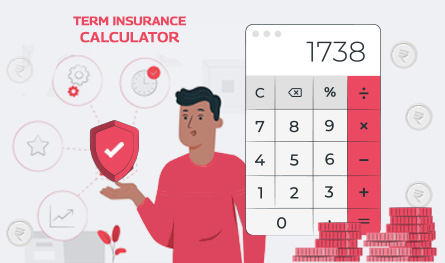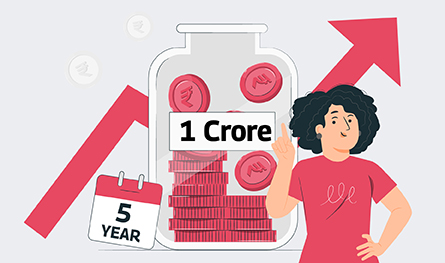Difference Between Fixed Deposits FDs and Recurring Deposits RDs
.png)
Investments are essential for our life as they ensure our financial security, especially during our hard times. For investment purposes, you can trust the two accounts, Fixed Deposit and Recurring Deposit. Let’s learn about these two accounts in detail.
.png)
Looking at the unpredictability of the present times, it is important to invest in different funds to secure your future well. Irrespective of the fact how much you are earning currently, getting investments done for the future is a must for everyone.
Fixed Deposits (FDs) and Recurring Deposits (RDs) are two such important and low risk investments which suit investors looking for safe investment options. However, the two plans have certain differences too, which we are discussing in this post.
What is a Recurring Deposit?
Recurring Deposit (RD) is an investment plan offered by almost all banks, post-offices and other financial institutions in India. An investor can contribute a particular sum of money to their RD account to receive guaranteed returns after a fixed tenure, which is decided by the investor at the time of buying the plan. It can range in between 6 months to 10 years. Also, the interest rate offered under RD varies as per the bank that you are getting your RD account opened.
Features of Recurring Deposits
- RD supports an investor to invest money regularly and to develop the habit of saving. Also, the corpus accumulated can be used to meet your future goals in life
- The minimum amount required to open a RD account is INR 500 and it can be any maximum amount as per your income
- The investor has the flexibility of choosing the tenure of an RD
- The corpus of RD accounts can also be used as collaterals for loans
What is a Fixed Deposit?
A Fixed Deposit (FD) is a type of investment that allows the investor to invest money for a fixed period of time and to earn high returns in exchange. You can open a FD account at a post office, bank, or in a NBFC as per your choice. However, you must check the interest rate offered by a particular financial institution as it may vary depending on the financier. The returns on the account, however, are as per the tenure of the FD and the amount deposited by the investor.
Features of Fixed Deposits
Below are some features of FD;
- FD account can be opened without any hassle at your nearest post office or bank
- FD accounts allow a rate of interest which is high as compared to saving accounts
- FD account can be renewed as per your convenience
- The maturity amount earned from your FD account cannot be withdrawn before the end of the FD tenure
Recurring Deposit (RD) Vs Fixed Deposit (FD)
Let us now take a look at the key differences between Fixed Deposit and Recurring deposit in the table below.
| Feature | Recurring Deposit | Fixed Deposit |
| Frequency of Investment | It can be any amount of money that can be invested by the investor regularly at intervals | In this case, the investor is required to invest an amount as a one-time investment and cannot make any further contributions later on during the term of the investment |
| Duration of deposit | Recurring deposit allow the investor to choose a duration of 6 months to over 10 years | In case of fixed deposit, the duration of tenure can range from 7 to 10 years |
| Interest Earned | The interest earned in recurring deposit is similar or low than that of FD interest | The interest earned under fixed deposit is higher than recurring deposit |
| Withdrawal of Maturity | The RD maturity deposit can be withdrawn on a quarterly or regular interval | In a fixed deposit, the maturity amount is only provided after the end of the FD tenure |
| Benefit Offered | With RD, one can inculcates the habit of savings by investing money in the RD deposit regularly/monthly | Fixed deposit, on the other hand, is a lump sum amount that is deposited and on which the investor can earn interest |
| Clause of Payment | In RD, if you do not make a payment for 6 months or more, there are chances of the RD account getting closed | On the other hand, in case of FDs where the total payment is made in one go, there is no clause of payment attached with the FD |
Which One would you pick – RD or FD?
Now that you know the meaning and the difference between fixed deposit and recurring deposit in India, the question that comes to your mind is which investment plan to choose – RD or FD.
It actually depends on the investor to choose between the two plans. Both these plans are low-risk options and depending on your finances or the ability to pay (lump-sum amount or small regular amount), you can make the choice.

Author Bio
Paybima Team
Paybima is an Indian insurance aggregator on a mission to make insurance simple for people. Paybima is the Digital arm of the already established and trusted Mahindra Insurance Brokers Ltd., a reputed name in the insurance broking industry with 17 years of experience. Paybima promises you the easy-to-access online platform to buy insurance policies, and also extend their unrelented assistance with all your policy related queries and services.
Other Life Insurance Products
Latest Post

Let’s be honest – life insurance planning isn’t exactly someone’s weekend hobby. It is the financial equivalent of flossing: we understand its importance, but we tend to put it off. But somewhere between balancing work and life, you might realise you need to have a solid plan in place – just in case.


If you think of life insurance, chances are you are picturing something people buy in their 30s or 40s. But what if you are 65 or older and just getting started? The good news is that you are never too late. Whether you are thinking of easing the financial burden on your family, covering final expenses, or simply leaving behind a legacy, there are life insurance options tailored just for you.
This article will be a guide to life insurance for senior citizens above 65 years, explaining why it is important, the type of insurance options, and how to get the right policy for you.


Health insurance plans are purchased with the hope of medical protection in times of need. However, sometimes it ends up being a source of surprise and disappointment. This mostly happens when people rush to buy health insurance plans, often overlooking essential aspects. Ignoring waiting period clauses, misunderstanding exclusions, and being unaware of sub-limits can lead to unwanted problems in the future.


If you are looking at investment policies offering INR 1 Crore in 5 years, we talk about some excellent plans in this post to help you choose the best one and reach your goal. However, it is important not to get swayed. Doing proper research and taking advice from financial or insurance advisors is important. Learn about such investment plan in this post.

The last few years have made it very clear that having health insurance is essential for everyone. Whether you are a young professional or a senior citizen, are single or have a family to support, health insurance cannot be ignored. Keeping this in mind, health insurance companies offer comprehensive plans that suit people with varied insurance needs.




